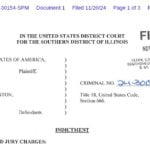Naperville, IL. (ECWd) –
***UPDATE: November 24, 2015: This issue has been resolved, we understand that after an internal investigation into this matter, this FOIA Officer is no longer employed with the Naperville Police Department.
—
We received a tip that some Naperville Police Department personnel were using public computers to try and influence House and Senate Bills 1320 that deal with Police Pension Reform.
In response to our Freedom Of Information Act (“FOIA”) request, there were several emails provided talking about the Bills, but none that I would consider to be crossing the line and attempting to influence the passage of the Bills.
OK, so it was initially a non-story for us, however, the process the Naperville Police Department used in responding to the Freedom Of Information Act request for information became a story in and of itself.
When redactions are made to public records, the recipient generally has to trust that the redactions were lawful redactions, and that they are not entitled to the information that was redacted. That is the way it is supposed to be, and since police departments, above everyone else, are supposed to follow the law, we should generally believe they would not redact items they were not authorized to redact. After all, the Freedom Of Information Act is a law, and it does have criminal consequences (see Section 4 of the Local Records Act)(see also Section 33-3 (a) (1) and (2) of the Criminal Code).
What may be redacted in these emails?
According to Section 7 (c) of FOIA, “personal [private] information contained within public records” may be redacted.
To define “Private” information, we look at Section 2 (c-5):
<span style="font-family: Courier New; font-size: small;">(c-5) "Private information" means ... <span style="text-decoration: underline;"><strong>home or personal telephone numbers</strong></span>, and <span style="text-decoration: underline;"><strong>personal email addresses</strong></span>. Private information also includes home address and <span style="text-decoration: underline;">personal</span> license plates... </span>
Please note there are obvious differences between personal, and public or business telephone and email information.
Also keep in mind that the public body can release the information (unless a law specifically prohibits it: ie: SSN, medical info, etc.). So the NPD made the decision to redact, even though they could have left it unredacted.
What was actually redacted?
When I opened one of the pdf’s I noticed that there were little blue lines in the redacted part of the document. That meant there were email addresses under the redaction that I could simply click on and obtain the email address. This happens when you do not disable the “hotlink” in the text prior to using the redaction method used.
I immediately replied to the NPD FOIA Officer and asked her to confirm that only private email addresses were redacted, and I even made a special reminder that public body email addresses were not redactable as they were not private.
[documentcloud url=”https://www.documentcloud.org/documents/2092632-stoner-1/annotations/221490.js” ]
She responded a couple of days later that all of the redaction’s were “private” email addresses.
[documentcloud url=”https://www.documentcloud.org/documents/2092631-stoner-2/annotations/221491.js” ]
Upon information and belief, the redactions were not personal email addresses, but rather email addresses of other public body employees, delivered to their public email addresses.
As you can see below, this particular email was sent to government employee email addresses who worked at the Cities of Champaign, Bloomington, Rockford, Urbana, Aurora, Elgin, Peoria, Naperville, Waukegan, Belleville, Normal, and also to “City Water, Light, and Power” – a municipally owned utility.
Anthony Cobb <[email protected]>, "Brendan Heffner ([email protected])" <[email protected]>, Chet Epperson <[email protected]>, "[email protected]" <[email protected]>, "Gregory Thomas ([email protected])" <[email protected]>, Jeff Swoboda <[email protected]>, Jerry Mitchell <[email protected]>, "[email protected]" <[email protected]>, Rick Bleichner <[email protected]>, "Marshall, Robert" <[email protected]>, "[email protected]" <[email protected]>, William Clay <[email protected]>
[documentcloud url=”http://www.documentcloud.org/documents/2089221-hb1320-foia-marshall-email-04-17-15.html” container=”#DV-viewer-2089221-hb1320-foia-marshall-email-04-17-15″]
.
How do I know this was intentional?
Simple, I asked her who made the redactions.
[documentcloud url=”https://www.documentcloud.org/documents/2092704-stoner-3/annotations/221500.js” ]
She replied that she did.
[documentcloud url=”https://www.documentcloud.org/documents/2092703-stoner-4/annotations/221501.js” ]
I wanted to rule out any claims that someone else redacted them and she only forwarded their redactions to me.
What’s the big deal?
First,the Police Department FOIA Officer flat out lied and needs to be dealt with. This is a Primary Obligation of the Police Department and people are entitled to full and complete information.
Second, if they lied about this, did they actually provide all the emails? Or did they leave out the incriminating ones?
Third, there are other items redacted that probably were not supposed to be redacted, and there are other PDFs redacted to where I could not tell what the email address was underneath the redaction – so in this instance I do not know what those were, and cannot further track public emails to investigate whether or not a recipient of them used public emails for the purpose of influencing the House and Senate Bills.
Finally, if the public servants whose primary duty is to uphold the law intentionally break the law, the law is rendered meaningless and the public loses trust in everything they do. What else are they lying about? What other laws do they break to suit their needs?









9 Comments
aylwinforbes
Posted at 09:29h, 05 JuneNaperville Police Dept. caught lying on FOIA documents – http://t.co/0u314fyvAW via @ECWDogs So how far do you trust your police department?
EERhinehart
Posted at 04:46h, 05 JuneRT @FICMediaLaw: Naperville Police Dept. caught lying on #FOIA docs http://t.co/jKgYya3nud
FICMediaLaw
Posted at 04:45h, 05 JuneNaperville Police Dept. caught lying on #FOIA docs http://t.co/jKgYya3nud
NaperJobs
Posted at 21:00h, 04 JuneNaperville Police Dept. caught lying on FOIA documents –: We received a tip that some Naperville P… http://t.co/6pDHAtPoYQ #naperville
Jake_Witmer
Posted at 20:53h, 04 JuneRT @ljarratt: Lincoln Report (Naperville Police Dept. caught lying on FOIA documents –)… http://t.co/sCflngoLf2
LennieJarratt
Posted at 20:32h, 04 JuneNaperville Police Dept. caught lying on FOIA documents – http://t.co/Auf8hcynCv
ChampionNewsNet
Posted at 20:32h, 04 JuneNaperville Police Dept. caught lying on FOIA documents – – http://t.co/jY8Jd2R45v
ljarratt
Posted at 20:32h, 04 JuneNaperville Police Dept. caught lying on FOIA documents – – http://t.co/7KZfQf5Zu3
ljarratt
Posted at 20:31h, 04 JuneLincoln Report (Naperville Police Dept. caught lying on FOIA documents –)… http://t.co/sCflngoLf2